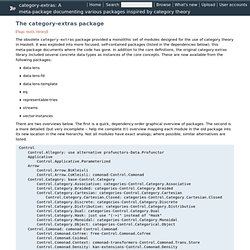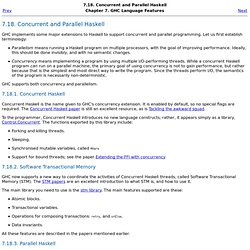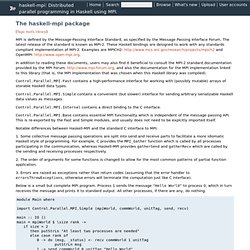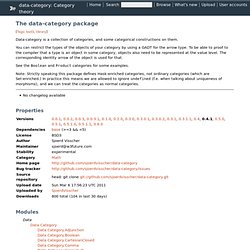

Category-extras-1.0.2. The obsolete category-extras package provided a monolithic set of modules designed for the use of category theory in Haskell.

It was exploded into more focused, self-contained packages (listed in the dependencies below); this meta-package documents where the code has gone. In addition to the core definitions, the original category-extras library included several concrete data types as instances of the core concepts. These are now available from the following packages: data-lens data-lens-fd data-lens-template eq representable-tries streams vector-instances There are two overviews below.
No changelog available Properties Modules Downloads Maintainers' corner For package maintainers and hackage trustees edit package information. 7.18. Concurrent and Parallel Haskell. GHC implements some major extensions to Haskell to support concurrent and parallel programming.

Let us first establish terminology: GHC supports both concurrency and parallelism. 7.18.1. Concurrent Haskell Concurrent Haskell is the name given to GHC's concurrency extension. To the programmer, Concurrent Haskell introduces no new language constructs; rather, it appears simply as a library, Control.Concurrent. 7.18.2. GHC now supports a new way to coordinate the activities of Concurrent Haskell threads, called Software Transactional Memory (STM). The main library you need to use is the stm library.
Atomic blocks.Transactional variables.Operations for composing transactions: retry, and orElse.Data invariants. All these features are described in the papers mentioned earlier. GHC includes support for running Haskell programs in parallel on symmetric, shared-memory multi-processor (SMP). GHC only supports parallelism on a shared-memory multiprocessor. Haskell-mpi-1.0.0. MPI is defined by the Message-Passing Interface Standard, as specified by the Message Passing Interface Forum.

The latest release of the standard is known as MPI-2. These Haskell bindings are designed to work with any standards compliant implementation of MPI-2. Examples are MPICH2: and OpenMPI: In addition to reading these documents, users may also find it beneficial to consult the MPI-2 standard documentation provided by the MPI Forum: and also the documentation for the MPI implementation linked to this library (that is, the MPI implementation that was chosen when this Haskell library was compiled). Control.Parallel.MPI.Fast contains a high-performance interface for working with (possibly mutable) arrays of storable Haskell data types. Category theory.
Data-category-0.4.1. Data-category is a collection of categories, and some categorical constructions on them.

You can restrict the types of the objects of your category by using a GADT for the arrow type. To be able to proof to the compiler that a type is an object in some category, objects also need to be represented at the value level. The corresponding identity arrow of the object is used for that. See the Boolean and Product categories for some examples. Note: Strictly speaking this package defines Hask-enriched categories, not ordinary categories (which are Set-enriched.) No changelog available Properties Modules Downloads Maintainers' corner For package maintainers and hackage trustees edit package information.
Category-extras-0.53.5. Category extras.